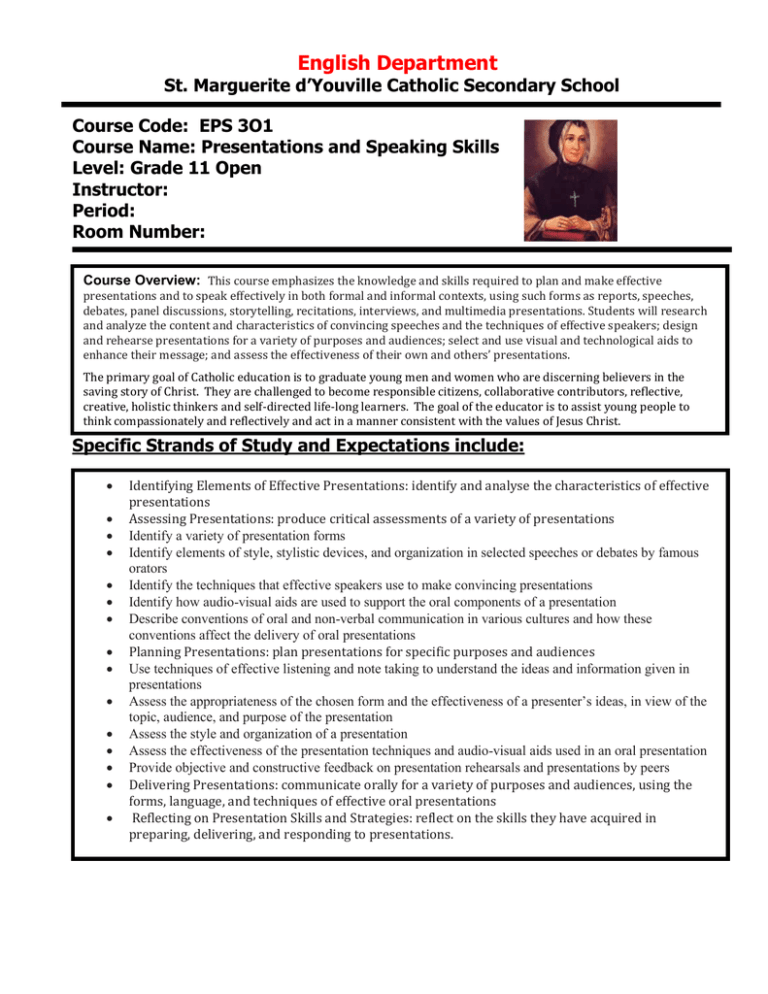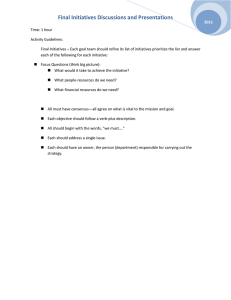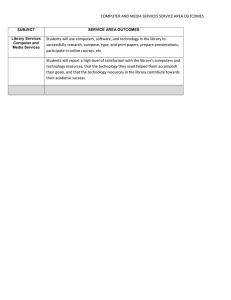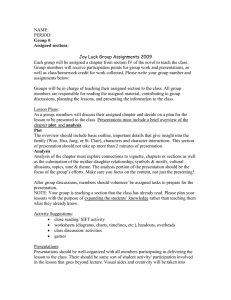English Department
advertisement

English Department St. Marguerite d’Youville Catholic Secondary School Course Code: EPS 3O1 Course Name: Presentations and Speaking Skills Level: Grade 11 Open Instructor: Period: Room Number: Course Overview: This course emphasizes the knowledge and skills required to plan and make effective presentations and to speak effectively in both formal and informal contexts, using such forms as reports, speeches, debates, panel discussions, storytelling, recitations, interviews, and multimedia presentations. Students will research and analyze the content and characteristics of convincing speeches and the techniques of effective speakers; design and rehearse presentations for a variety of purposes and audiences; select and use visual and technological aids to enhance their message; and assess the effectiveness of their own and others’ presentations. The primary goal of Catholic education is to graduate young men and women who are discerning believers in the saving story of Christ. They are challenged to become responsible citizens, collaborative contributors, reflective, creative, holistic thinkers and self-directed life-long learners. The goal of the educator is to assist young people to think compassionately and reflectively and act in a manner consistent with the values of Jesus Christ. Specific Strands of Study and Expectations include: Identifying Elements of Effective Presentations: identify and analyse the characteristics of effective presentations Assessing Presentations: produce critical assessments of a variety of presentations Identify a variety of presentation forms Identify elements of style, stylistic devices, and organization in selected speeches or debates by famous orators Identify the techniques that effective speakers use to make convincing presentations Identify how audio-visual aids are used to support the oral components of a presentation Describe conventions of oral and non-verbal communication in various cultures and how these conventions affect the delivery of oral presentations Planning Presentations: plan presentations for specific purposes and audiences Use techniques of effective listening and note taking to understand the ideas and information given in presentations Assess the appropriateness of the chosen form and the effectiveness of a presenter’s ideas, in view of the topic, audience, and purpose of the presentation Assess the style and organization of a presentation Assess the effectiveness of the presentation techniques and audio-visual aids used in an oral presentation Provide objective and constructive feedback on presentation rehearsals and presentations by peers Delivering Presentations: communicate orally for a variety of purposes and audiences, using the forms, language, and techniques of effective oral presentations Reflecting on Presentation Skills and Strategies: reflect on the skills they have acquired in preparing, delivering, and responding to presentations. Course Breakdown Unit 1 – Speech Analysis Unit 2 – Personal & School Resources: The course will use a variety of resources including video, CD-ROM, Internet Applications and a variety of print sources. All resources assigned to students are the responsibility of the student. Any damage incurred will result in payment for replacement. Materials Required: Pens, pencils, erasers, highlighters 3 ringed binder with lined paper Unit 3 – Business & Workplace (and “The Interview”) Evaluation Structure: Unit 4 – Persuasive Unit 5 – Social Issues Unit 6 – Storytelling Knowledge/Understanding Thinking Communication Application 25% 25% 25% 25% The above is reflected both in the term work (worth 70% of the final mark) and the summative work (worth 30% of the final mark). Summative work consists of the Final Exam (15%) and a Culminating Activity (15%). Evaluation Policy Students will be assessed & evaluated according to the work produced & skills displayed. Methods of providing feedback will include assessing work in process & evaluating completed assignments, tests, co-operative learning activities, simulations and presentations. Student marks will be determined by evaluating process & product according to four categories & four levels. Please see the chart below for specific skills and key words used to determine student competency in the different categories. Below 50% Level 1: Level 2: Level 3: Level 4: Level 50-59% 60-69% 70-79% 80-100% Category Insufficient A passable A moderate A high level A very high to Knowledge/Understanding achievement level of level of of outstanding Recall of facts, knowledge of forms and content, understanding of curriculum achievement. achievement. achievement. level of content expectations. Achievement Achievement Achievement achievement. Thinking/Inquiry is below the is below, but is at the Achievement Interpretation and analysis, problem solving, creativity provincial is above the approaching provincial Communication standard. the standard. provincial Communicating information in writing provincial standard. Choice of language and style for audience use of appropriate genre standard. Grammar, language usage, spelling, punctuation Application Speaking and using the right media/medium Reading strategies (scanning critically and rhetorically) Writing and rewriting (use of resources) Applying theory of criticism (English and others subjects of the world) A student whose achievement is below 50% at the end of the course will not obtain a credit for the course. Feedback will also be provided for student learning skills. Skills like working independently, team work, organization, work habits and homework, and initiative are assessed independently and will be conducted through the use of a rubric indicating specific criteria to be achieved to receive each of the following letter grades: E –Excellent G – Good S – Satisfactory N - Needs Improvement Other Evaluation Issues LATE ASSIGNMENTS. Assignments submitted after the Primary Due Date established by the teacher will be accepted with a penalty of 10% one day after the primary due date. After, a mark of zero will be assigned. Repeated lateness in submissions indicates poor organization skills and will result in parental contact. Assignment extensions will be given at the teacher’s discretion; if you require an extension, your request must be made well in advance of the assignment’s due date. Keep a copy of ALL assignments (especially essays) MISSED TESTS A test missed with a legitimate reason will be written within a few days of the student's return from the absence. Student eligibility to write the test and the date of writing will be at the discretion of the teacher. Any student who misses a test or assignment and whose absence is unjustified (i.e. no phone call or no note according to the attendance office- skip) will NOT be allowed to rewrite or make up a missed test or assignment. PLAGIARISM Plagiarism is the act of taking someone else’s words and presenting them as your own. This is cheating and will result in an automatic ZERO. Parents will be informed and may be asked to meet with the subject teacher. To protect yourself, keep all your work-inprogress (rough notes). For some assignments, you will be asked to submit this process work along with your final product. TURNITIN All written assignments MUST be submitted to turnitin.com. Failure to do so will result in the student receiving a mark of ZERO ABSENCE POLICY Any student who misses more than 7 classes will be required to complete an “absence assignment” in order for a credit to be granted. School activities and absences for which a medical note is provided will not count toward the 7-day maximum. PARENTS Parents are encouraged to call their teachers on a regular basis if there are any concerns regarding attendance, assignments, test policies or any others concerns. Expect one hour of homework each night on average. If class work is done, students should always be reviewing to remember what they learned by making review/study notes summarizing the weeks/months lessons. STUDENTS You must take ownership of your learning. If you are struggling with the material or you have some concerns, please speak to me before or after school. If you feel comfortable doing so, please ask questions in class so others may benefit from your inquiry


